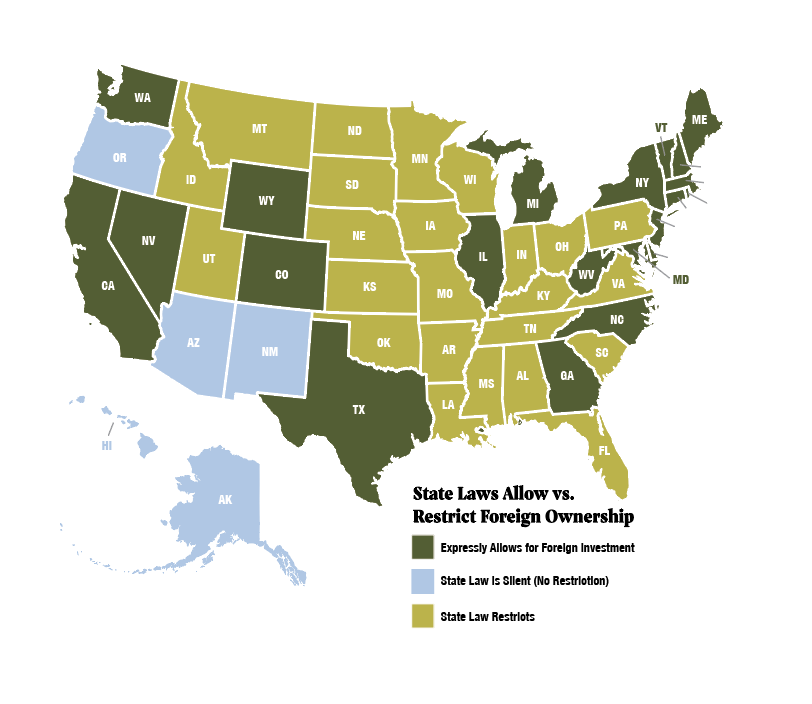GFB News Magazine
Foreign land ownership, state animal welfare laws key issues for farmers
by Jay Stone
Posted on November 25, 2023 11:17 AM
By Jay Stone
Thousands of court cases with potential for eight-figure penalties make it vital that the agricultural sector keep abreast of legal developments. The National Agricultural Law Center (NALC) performs that function and works with a wide variety of farm stakeholder groups, including Farm Bureau, to help them develop policy stances.
NALC Director Harrison Pittman provided an overview of state laws addressing the ownership of American agricultural land by foreign entities during the Georgia Farm Bureau Commodity Conference in Athens in August.
Pittman also discussed the evolution of state laws banning foreign ownership of agricultural land.
“Georgia's had an experience with this. There were a couple of proposals,” Pittman said. “They did not make it out of the legislature. I know that it’s likely to come back up.”

Graphic Courtesy of National Agricultural Law Center
Currently, no state has an outright ban on foreign ownership. There are 24 states that have laws that restrict foreign ownership of agricultural land. Five states have no restrictions, and 21 states, including Georgia, have laws that allow foreign ownership.
The history of laws prohibiting or restricting foreign ag land ownership date back at least to the late 1800s as the U.S. expanded westward. Pittman noted a political climate then that held fears of wealthy Europeans buying enough land to colonize.
In 2023, 12 states (Florida, Alabama, Tennessee, Virginia, Ohio, Louisiana, Arkansas, Oklahoma, North Dakota, Montana, Idaho and Utah) enacted foreign ownership laws, and at least one is already taking action to enforce it. On Oct. 17, Arkansas Attorney General Tim Griffin ordered a Chinese state-owned subsidiary of Syngenta Seeds to divest itself of ag land under the state’s foreign ownership law, the NALC reports.
On Dec. 31, 2021, the latest date for which official data is available, there were 40,031,308 acres of U.S. private agricultural land owned by foreign entities, which was 2.4 million fewer acres than on Dec. 31, 2020. In 2021, China owned 383,935 acres of U.S. agricultural land.
Much of the concern over foreign ownership has centered on individuals and organizations from China, Iran, North Korea and Russia and on foreign-owned land near U.S. military bases.
The federal government currently has no restrictions or prohibitions of foreign ag land ownership, though it does monitor foreign farmland ownership under the Agricultural Foreign Investment Disclosure Act (AFIDA) of 1978. The USDA’s Farm Service Agency (FSA) administers AFIDA implementation and annually generates reports detailing foreign ag land ownership. To view those reports, visit https://gfb.ag/FSAAFIDAreports.
In Georgia, 3.9% of agricultural land is under foreign ownership. The two largest portions of that are 271,189 acres owned by German interests and 217,684 by Canadians. Rounding out the top five nationalities of foreign owners of Georgia ag land are the United Kingdom (43,035 acres), the Netherlands (28,556 acres) and Italy (7,816 acres). Entities from all other countries combine to own 647,008 acres of Georgia ag land.
The states with the highest percentage of foreign ownership of their farmland were Maine (20.1%), Hawaii (9.2%), Washington (7.2%), Alabama (6.3%) and Florida (6.3%).
Pittman predicted there would be lawsuits over foreign ownership laws, likely from the energy and real estate sectors.
State animal welfare laws impact producers nationwide
On a separate legislative development in response to California’s Proposition 12 and ballot initiatives in other states, Congress has bills under consideration that would prohibit state and local jurisdictions from interfering with production of commodities in other states.
The California law prevents the sale in California of pork produced using practices, such as gestation crates, that do not conform to the state’s animal welfare standards. Producers in other states that have different standards essentially fall under California state law.
The Ending Agricultural Trade Suppression (EATS) act was introduced in the U.S. Senate by Iowa Republican Ashley Hinson on June 15 and on June 30, Rep. Roger Marshall (R-Kansas) in the U.S. House. The bill would prohibit state and local jurisdictions from interfering with production of commodities in other states.
American Farm Bureau, the National Pork Producers Council and the National Cattlemen’s Beef Association support EATS. A coalition of 16 state attorneys general from Arkansas, Idaho, Indiana, Kentucky, Mississippi, Missouri, Montana, New Hampshire, Oklahoma, South Dakota, Texas, Utah, Virginia and West Virginia support Eats. Another 16 state attorneys general from Michigan, Illinois, Arizona, California, Connecticut, Dist. of Columbia, Hawaii, Maine, Maryland, Massachusetts, New Jersey, New Mexico, New York, Oregon, Pennsylvania and Vermont oppose EATS. At press time there were at least 12 Republican representatives opposing EATS.